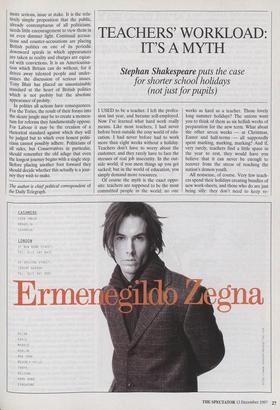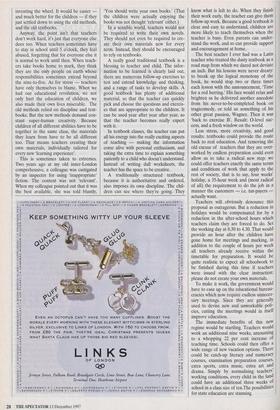TEACHERS' WORKLOAD: IT'S A MYTH
Stephan Shakespeare puts the case
for shorter school holidays (not just for pupils)
I USED to be a teacher. I left the profes- sion last year, and became self-employed. Now I've learned what hard work really means. Like most teachers, I had never before been outside the cosy world of edu- cation. I had never before had to work more than eight weeks without a holiday. Teachers don't have to worry about the customer, and they rarely have to face the stresses of real job insecurity. In the out- side world, if you mess things up you get sacked; but in the world of education, you simply demand more resources.
Of course the myth is the exact oppo- site: teachers are supposed to be the most committed people in the world; no one works as hard as a teacher. Those lovely long summer holidays? The unions want you to think of them as six hellish weeks of preparation for the new term. What about the other seven weeks — at Christmas, Easter and half-terms — all supposedly spent marking, marking, marking? And if, very rarely, teachers find a little space in the year to rest, they would have you believe that it can never be enough to recover from the stress of teaching the nation's demon youth.
All nonsense, of course. Very few teach- ers spend their holidays creating bundles of new work-sheets, and those who do are just being silly: they don't need to keep re- inventing the wheel. It would be easier — and much better for the children — if they just settled down to using the old methods, and the old textbooks.
Anyway, the point isn't that teachers don't work hard, it's just that everyone else does too. When teachers sometimes have to stay in school until 5 o'clock, they feel abused, forgetting that for everyone else it is normal to work until then. When teach- ers take books home to mark, they think they are the only people on earth whose responsibilities sometimes extend beyond the nine-to-five. As for stress — teachers have only themselves to blame. When we had our educational revolution, we not only hurt the education of children, we also made their own lives miserable. The old methods relied on discipline and text- books. But the new methods demand con- stant super-human creativity. Because children of all different abilities have to be together in the same class, the materials they learn from have to be all different too. That means teachers creating their own materials, individually tailored for every new 'learning experience'.
This is sometimes taken to extremes. Two years ago at my old inner-London comprehensive, a colleague was castigated by an inspector for using 'inappropriate' fiction. The content was not 'relevant'. When my colleague pointed out that it was the best available, she was told bluntly, 'You should write your own books.' (That the children were actually enjoying the books was not thought 'relevant' either.) In a sensible world, teachers would not be required to write their own novels. They should not even be required to cre- ate their own materials new for every term. Instead, they should be encouraged to rely on textbooks.
A really good traditional textbook is a blessing to teacher and child. The infor- mation to be learned is clearly laid out, there arc numerous follow-up exercises to test and extend knowledge and thinking, and a range of tasks to develop skills. A good textbook has plenty of additional material, so that the teacher can quickly pick and choose the questions and exercis- es that are appropriate to the children. It can be used year after year after year, so that the teacher becomes really expert with it.
In textbook classes, the teacher can put all his energy into the really exciting aspects of teaching — making the information come alive with personal enthusiasm, and taking the extra time to explain something patiently to a child who doesn't understand. Instead of writing dull worksheets, the teacher has the space to be creative.
A traditionally structured textbook, because it is authoritative and ordered, also imposes its own discipline. The chil- dren can see where they're going. They know what is left to do. When they finish their work early, the teacher can give them follow-up work. Because a good textbook is clear and easy to understand, children are more likely to teach themselves when the teacher is busy. Even parents can under- stand the work, and so can provide support and encouragement at home.
The best teacher I ever had was a Latin teacher who treated the dusty textbook as a road map from which we dared not deviate an inch. But his lessons were never dreary: to break up the logical monotony of the book, he would stop two or three times each lesson with the announcement, 'Time for a red herring.' His face would relax and brighten as he delivered another anecdote from his never-to-be-completed book on tragicomedy, or told us something of his other great passion, Wagner. Then it was 'back to exercise B'. Result: 0-level suc- cess, and a fresh window on the world.
Less stress, more creativity, and good results: textbooks could provide the route back to real education. And removing the old excuse of teachers that they are over- worked by endless preparation could even allow us to take a radical new step: we could offer teachers exactly the same terms and conditions of work that apply to the rest of society, that is to say, four weeks' holiday, a 35-hour week and (most radical of all) the requirement to do the job in a manner the customers — i.e. tax-payers — actually want.
Teachers will obviously denounce this proposal as outrageous. But a reduction in holidays would be compensated for by a reduction in the after-school hours which teachers claim they are forced to do. Set the working day at 8.30 to 4.30. That would provide an hour after the children have gone home for meetings and marking, in addition to the couple of hours per week all teachers already receive within the timetable for preparation. It would be quite realistic to expect all schoolwork to be finished during this time if teachers were issued with the clear instruction: please do not create your own materials. To make it work, the government would have to ease up on the educational bureau- cracies which now require endless unneces- sary meetings. Since they are generally used to devise new and unworkable poli- cies, cutting the meetings would in itself improve education.
The immediate benefits of this new regime would be startling. Teachers would work an additional nine weeks, amounting to a whopping 22 per cent increase of teaching time. Schools could then offer a wide range of new vacation options. There could be catch-up literacy and numeraeY courses, examination preparation courses, extra sports, extra music, extra art and drama. Simply by normalising teachers working conditions, every child in the land could have an additional three weeks of school in a class size of ten.The possibilities for state education are stunning.



















































































 Previous page
Previous page